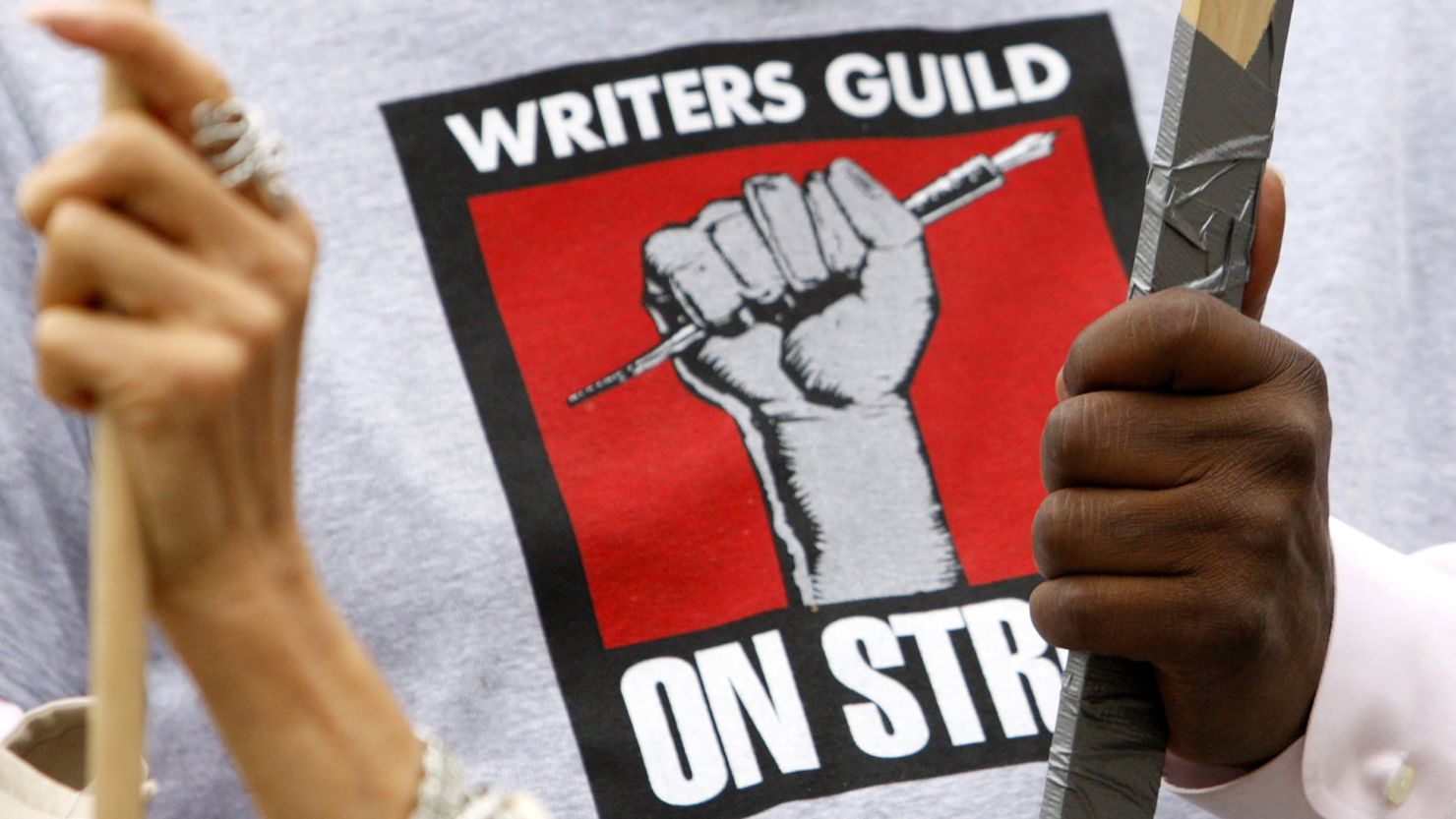The clock is ticking toward a costly strike that could shut down production on most television shows, pushing back the return of many programs now set for the fall.
Last month, members of the Writers Guild of America voted 98% in favor of going on strike if no new deal is reached before their current contract expires at 11:59 pm PDT Monday. With less than a day left before the deadline, the two sides appear far apart.
The talks come at a time both sides are feeling pain. Many of the media and tech companies producing shows that use the writers have seen drops in their stock price, prompting deep cost cutting, including layoffs. But the writers, many of whom can’t support themselves with writing alone, are suffering from reduced job opportunities and the loss of some sources of income due to an industry shift from traditional broadcast and cable programming to streaming services.
“The companies have used the transition to streaming to cut writer pay … worsening working conditions for series writers at all levels,” said a statement from the union. “On TV staffs, more writers are working at minimum regardless of experience, often for fewer weeks [of pay]….While series budgets have soared over the past decade, median writer-producer pay has fallen.”
“This is not an ordinary negotiating cycle,” said Danielle Sanchez-Witzel, a member of the union’s negotiating team, in a video message to members a month ago. “We are fighting for writers’ economic survival and stability of our profession.”
The union is negotiating with Alliance of Motion Pictures and Television Producers, which represents Amazon (AMZN), Apple (AAPL), CBS (VIAC), Disney (DIS), NBC Universal, Netflix (NFLX), Paramount Global, Sony (SNE) and CNN’s parent company, Warner Bros. Discovery.
“Our goal continues to be to reach a fair and reasonable agreement,” said a statement from management. “The AMPTP companies have approached these negotiations with the long-term health and stability of the industry as our priority. We are all partners in charting the future of our business together and we are fully committed to reaching a mutually-beneficial deal.”
While many shows have already filmed their final episodes for the current season, viewers could see an immediate impact with late night shows, daytime soap operas and shows such as Saturday Night Live, which could have early ends to their seasons.
Show host Seth Meyers, who was on the picket line as a writer at Saturday Night Live during the last strike, prepared his viewers that Late Night with Seth Meyers won’t be on the air if there is a strike. He did say in a YouTube message posted last week that he said he was “incredibly hopeful that they can come to an agreement.”
Other shows likely to be immediately impacted did not immediately respond to requests for comments about their plans.
With estimates that a strike could last for months — the last strike by this union, in 2007, went on for 100 days — the start of the new season could be pushed back.
“If this goes on we’ll see more reality, news and sports,” said Jonathan Handel, an entertainment attorney and author of the book, Hollywood on Strike!: An Industry at War in the Internet Age.
Handel is one of those who thinks a strike, quite possibly a months-long strike, is likely.
“There’s a lot of unfinished business from 2020 negotiations that were raised then but then put on ice by the pandemic,” he said.
The economics of the industry have change radically in just the last 18 months, he said, as many media and tech stocks have taken a beating on investor concern about profitability of streaming services. While initially the industry battle was to get the most subscribers, attention has now turned to the bottom line.
“Both the media companies and the tech companies that own streamers are engaged in belt tightening,” said Handel. “The tune today is profits.”
The union represents 11,500 writers for television shows, both for networks and streaming services, as well as many motion pictures. Not all of them are currently working, though. But if they do strike, it could have widespread implications for the industry, and for the economies of Southern California and some other locations, such as New York City.
There could be as many as 20,000 workers working on as many as 600 productions who could be out of work if the writers shutdown production, according to an estimate from AMPTP. The 2007 strike caused an estimated $2 billion in economic damage. Adjusted for inflation, that comes to nearly $3 billion today.
Management appears unlikely to give the union the improvements it says its members need to have a living wage. If anything, there are incentives to letting this drag on.
“The issue the writers are striking over are real, they’re meaningful, but their timing couldn’t be worse,” said Tom Nunan a lecturer at the UCLA School of Theater, Film and Television, as well as a film producer and writer.
“Media companies are laying people off, crying poor, reevaluating their investment in streaming and scrutinizing their more mature revenue streams,” he said. “I don’t think the studios have much to lose if there is a strike and there could be a lot for them to gain. If you have a work stoppage, you have instant savings.”
The writers are arguing their contracts need to factor in the entertainment industry’s shift to streaming. Residual fees — or money paid when a film or series is rerun or aired on broadcast — has helped provide much needed money for writers for years. But those fees are vanishing in the streaming era, which is where a great deal of projects ultimately land these days.
The writers are also seeing smaller writing staffs on shows than have been the case in the past, and fewer episodes of shows produced for streaming platforms than have been produced for broadcast networks in the past.
“Even if the union resolves the issues it has raised, the question of ‘Can this really be a career for me’ will still hang over most writers, post-strike,” said Nunan. “I know very few writers who pay the bills by writing alone.”
– CNN’s Vanessa Yurkevich and Oliver Darcy contributed to this report






